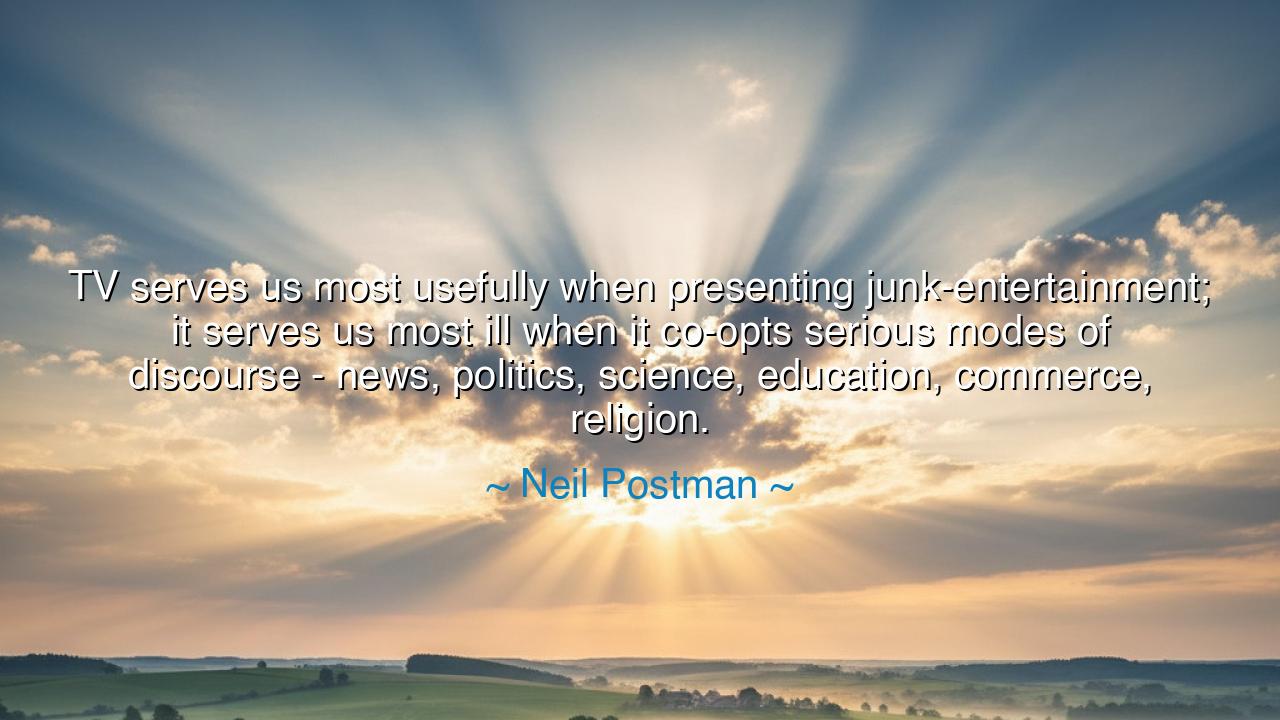
TV serves us most usefully when presenting junk-entertainment; it
TV serves us most usefully when presenting junk-entertainment; it serves us most ill when it co-opts serious modes of discourse - news, politics, science, education, commerce, religion.






The words of Neil Postman, prophet of media’s hidden dangers, sound like a warning bell echoing through the age of screens: “TV serves us most usefully when presenting junk-entertainment; it serves us most ill when it co-opts serious modes of discourse—news, politics, science, education, commerce, religion.” In these words, Postman unveils a paradox that strikes at the heart of modern civilization. For the medium of television is not evil when it amuses—it is dangerous when it pretends to instruct, to inform, or to guide the soul, reducing matters of gravity into spectacles of distraction.
The origin of this insight lies in Postman’s seminal work Amusing Ourselves to Death, written in the late twentieth century. He saw that TV, unlike the printed word, thrives on images, speed, and emotional stimulation. When it delivers junk-entertainment—comedies, dramas, and diversions—it fulfills its nature honestly, as bread and circuses for the masses. But when it dares to carry the weight of news, politics, or religion, it transforms truth into performance, and solemn discourse into theater. The danger is not in laughter or light amusement, but in the corruption of serious thought into entertainment’s shallow form.
History shows this truth vividly. Consider the debates of Abraham Lincoln and Stephen Douglas in 1858, where hours of argument were given to the public in long speeches, each filled with substance, logic, and moral vision. Compare this to the television debates of the twentieth century, where the winner was judged not by argument but by appearance, tone, and charm. Thus did John F. Kennedy’s tan and composure defeat Richard Nixon’s sweat and fatigue. The discourse of politics was transformed, not by the weight of truth, but by the camera’s gaze.
Or think of science, which in ancient times was debated in halls of study and demonstrated through experiment. On television, it often becomes reduced to spectacle: explosions, dazzling effects, or oversimplified declarations that bypass the slow labor of reasoning. Similarly, religion, which once demanded reflection, meditation, and reverence, is too often reshaped into televised sermons designed more to hold attention spans than to guide souls. In each case, the medium transforms the message, and depth is lost to entertainment’s glittering surface.
O seekers of wisdom, mark this well: every medium has its strength and its weakness. The scroll carried memory, the book carried depth, and the television carries spectacle. To use a tool against its nature is folly. To let TV instruct in matters of weight is to place wine in a cracked vessel—it leaks and is wasted. Postman reminds us that the most dangerous deception is not in foolish amusement, but in believing that entertainment can bear the load of education, politics, and religion without twisting them into shallow imitations.
The lesson for us is clear. We must guard the sanctity of serious discourse. Let TV be what it is—a fountain of diversion, a stage for laughter and story. But do not entrust to it the governance of your soul, the direction of your nation, or the pursuit of truth. Seek those in the written word, in discussion, in study, in the slow and difficult labor of thought. Only there can such weight be borne with fidelity.
Practical action lies before you: limit your reliance on television for understanding serious matters. Read books, engage in dialogue, attend lectures, and cultivate the patience for depth. When you watch, know what you are watching—do not confuse entertainment for truth. Teach your children that laughter is good, but wisdom is greater, and that some things cannot be consumed as spectacle without being diminished.
Thus let Postman’s warning endure: “TV serves us most usefully when presenting junk-entertainment; it serves us most ill when it co-opts serious modes of discourse.” Take these words as a shield against the seductions of spectacle. Let your soul not be lulled into sleep by glowing screens, but trained in discernment, so that you may laugh with joy at entertainment, yet turn with reverence and discipline to the deeper wells of truth.






AAdministratorAdministrator
Welcome, honored guests. Please leave a comment, we will respond soon